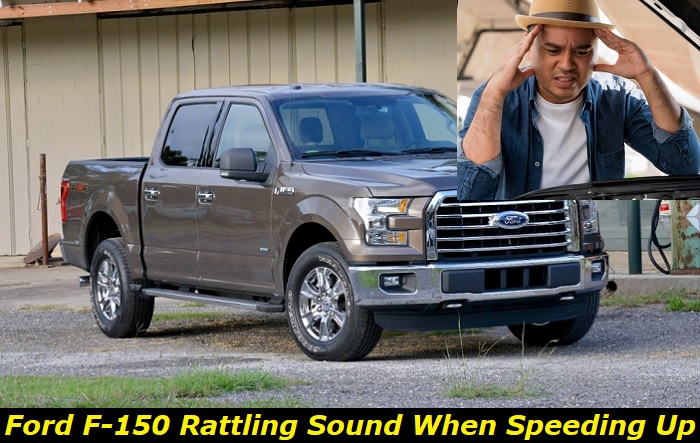Many Ford F150 truck owners have complained about design defects that make their expensive trucks sound rather loud and cheap. One owner lamented that his F150 had so many creaks, groans, and rattles that "it sounded like I had purchased a truck with 400k miles on it" Other owners complained that while they couldn't hear the noise with their windows rolled up, pedestrians usually hear the dreadful sound and look around for the source.
Engine noises highlights
- Level of importance:High
- Commonreasons:All kinds of various problems, hard to list promptly
- DIY inspection:Possible but may be complicated
- DIY repair:Impossible, in most cases
- Price for repair:$150 - $1,000
- Can you drive?Usually, yes
- Ways to fix:Locate the source for the sound and repair the system that needs help

Common Causes of Rattling Noises When Accelerating the F-150
A wide range of defects and malfunctions may cause a rattling noise when accelerating your F-150. Ford issued two Technical Service Bulletins (TSB 18-2354 and TSB 19-2093) that addressed some of the causes.
1) Loose Heat Shields
Loose heat shields cause a rattling noise that seems to come from the transmission. The rattling noise is most noticeable at high speeds. The heat shields in your F150 truck insulate components like your cabin, gas tank, and fuel line from coming into contact with the extremely hot exhaust system.
If your heat shields suffer damage that causes them to break or loosen, they will not perform the insulation duties as expected. Thus, heat will transfer to components that should remain cool, and trouble begins. If your heat shields fail to perform their thermo-reflective barrier duties, your truck can no longer move in silence.
Your F150 truck has heat shields made of cheap, low-grade aluminum that are a few steps shy of tin foil. Once the clamps holding the heat shields in place loosen or corrode, the shields are likely to dislodge or bend. When the clamps corrode and loosen, they dangle onto the exhaust pipe. The exhaust and dangling clamping will cause a rattle whenever your truck vibrates due to acceleration or even idling.
Solution
If you suspect damaged heat shields are behind the rattling noise, the fix may be simpler than you think. Inspect your exhaust system after allowing your F150 truck to cool down for several hours. Ensure your exhaust parts have completely cooled down because some remain hot for several hours after you turn off your engine.
Check the passenger's and driver's sides of the engine bay. You will have to get under your truck and firmly tug at the exhaust components to ensure they are secured firmly. Look for a clamp on the driver's side that is tightened around your heat shield and welded to the passenger side. If this clamp loosens, breaks, or corrodes, your F150 will likely rattle your teeth.
Most owners have fingered the heat shield bolted to their cross-members above the exhaust system. This shield often droops and creates contact with the cross member. Another likely suspect is the heat shield on the driver's side that appears above the manifold. Last on the most wanted for the embarrassing sound list is the heat shield on the right side of your wastegate near the engine's rear side.
2) Low-Quality Fuel
Some F150 owners have sworn that low-quality fuel was the culprit behind the rattling noise all along. If your truck's rattling noise is most noticeable when lightly accelerating but persists even during heavy throttle, poor-quality fuel may be to blame for the unwanted noise. The rattling may also be accompanied by a knocking or pinging noise.
Ford would have you believe that the F150 should purr like a kitten irrespective of whether owners choose 87 or 93 Octane Fuel. Skeptical owners insist that the F150 should run on no lower than Octane 91 and 93 oil. They insist Ford included the 87-octane fuel to secure cheaper ownership numbers on paper.
While lower-grade oil may not harm your vehicle, it causes reduced power and increased fuel consumption. In some instances, the lower octane fails to ignite efficiently, thus causing valve chatter and engine knock.
Solution
If you notice the rattling noise accompanied by knocking or pinging, you should consider switching to premium fuel. The higher the octane rating of your fuel, the less likely it is to detonate prematurely under high compression. Some F150 owners reported that the rattling noise disappeared after switching to premium fuel.
3) IWE Check Valve
Most F150 owners are already watching out for the all-too-common IWE Check Valve Vacuum malfunction. This problem is mostly caused by a dirty valve that fails to function optimally and contain the vacuum as expected.
Solution
The simplest solution to the IWE Check Valve malfunction is to remove the valve and clean it with a kerosene-based solution. Repeat the cleaning process until all the gunk is off the valve. When done cleaning and reinstalling, your valve should hold the vacuum efficiently once more.
You can use a vacuum pump to test the valve's efficiency. Avid DIYers who do not own or would rather not rent a vacuum pump use their tongues to get the job done. You read it right! Sucking on the valve's white end will show reveal whether the valve can 100% hold the vacuum.
If your IWE valve fails to hold the vacuum after several kerosene washes, you may have to replace it. Shop for an OEM replacement for your IWE check valve and solenoid. Alternatively, you can seek a high-quality compatible aftermarket alternative.
4) Faulty Cam Phasers
The cam phasers in your F150 are supposed to lock after shutting down at base timing. They are located in the head and allow time for the oil pressure to build up in your head on your next cold start. This oil pressure is supposed to unseat your locking pin so the power control module can control your phaser position using the VCT solenoid.
If the phasers in your F150 do not lock properly, they will rattle around until they build up enough oil pressure to fill your VCT unit.
Solution
Drivers can force their engine to accumulate enough pressure when they push the gas pedal to the metal while turning the key for about five seconds. Owners have reported doing this on your first start-up of the day or after the truck has been sitting for a long period, eliminates the horrendous rattling noise.
When you depress the gas pedal and start the ignition, you swing the starter and allow the engine to build enough oil pressure before it roars to a start. After five seconds, ease off the gas and turn your key again. If the rattling sound is no longer audible, then your cam phasers are to blame.
5) Malfunctioning Engine Accessories
Malfunctioning engine accessories could also cause the rattling noise bedeviling your F150 truck. The most common causes of rattling in this category are loose engine mounts and worn drive belt bearings.
Solution
If you suspect a malfunctioning engine accessory is causing the rattling noise, you must inspect all the components to identify the noise source. This is a complicated process that is best left to experienced mechanics.
It would be best if you began by inspecting the engine mounts to ensure they are not loose, damaged, or corroded. If the brackets have grown loose over time, tightening them should eliminate the rattle. If you notice that a belt accessory may be to blame, you may have to purchase a new OEM replacement part.
Experienced DIYers can remove the suspicious belt accessory and slightly rev the engine for a short time to investigate whether the noise persists in its absence. Do not run this test for more than a few seconds, as it may damage essential components like your alternator and water pump.
6) Internal Engine Failure
Some internal engine issues in your F-150 may be responsible for the rattling noise that has been following you around. The most common causes of rattling from your engine are rod knock, piston slap, and lifter challenges.
Piston slap rattling sounds a bit muffled and usually increases in frequency as you pick up speed. Rod knock makes a clattering noise that reduces frequency when you slow down. The noise produced by your life sounds like a ticking noise that increases in volume as your engine speed picks up.
Solution
Piston slap, rod knock, and lifter problems are expensive to diagnose and fix. They call for extensive engine work that requires advanced skills and plenty of time. If the rattling sound in your F150 seems to be coming from your engine bay, it is advisable to schedule a diagnosis and repair at your dealership or a reputable auto repair shop.
About the authors
The CarAraC research team is composed of seasoned auto mechanics and automotive industry professionals, including individuals with advanced degrees and certifications in their field. Our team members boast prestigious credentials, reflecting their extensive knowledge and skills. These qualifications include: IMI: Institute of the Motor Industry, ASE-Certified Master Automobile Technicians; Coventry University, Graduate of MA in Automotive Journalism; Politecnico di Torino, Italy, MS Automotive Engineering; Ss. Cyril and Methodius University in Skopje, Mechanical University in Skopje; TOC Automotive College; DHA Suffa University, Department of Mechanical Engineering






Add comment